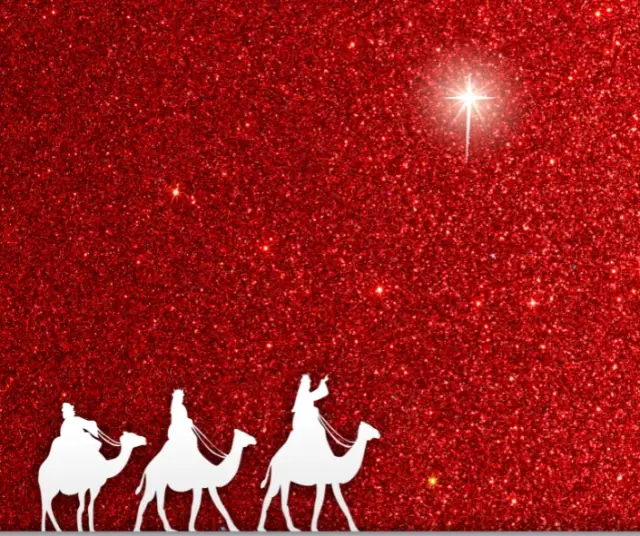Three Kings Day, also known as Epiphany, is a holiday celebrated around the world to commemorate the visit of the three Wise Men to the Baby Jesus. In Colombia, this celebration has great cultural and religious importance, and is carried out with various traditions and customs that reflect the richness of the country's diversity.
Origins of the Celebration in Colombia
The celebration of Three Kings Day in Colombia has its roots in the depths of Christian tradition, a narrative that merges with the various cultural influences present in this Latin American country. The Epiphany, which commemorates the arrival of the three Wise Men to Bethlehem, has become a holiday that transcends religion, incorporating elements of indigenous, African and European heritage.
From the first days of colonization, the Catholic Church played a central role in the introduction and spread of these festivities in Colombian territory. The arrival of European missionaries and colonizers brought with them Christmas traditions, including the veneration of the Three Wise Men. Over time, these customs became intertwined with indigenous beliefs and African practices, giving rise to a unique celebration full of symbolism in Colombia.
The fusion of these cultural influences is evident in artistic representations of the story of the Three Wise Men in Colombia. Local artistic expressions incorporate indigenous and African elements, from music and dance to the colorful clothing used in processions. This cultural mix has enriched the celebration, turning it into an authentic expression of Colombian diversity. Furthermore, the celebration of the Three Wise Men has evolved over the centuries to include not only religious aspects, but also social and community aspects. The tradition of leaving grass-filled shoes for the Kings' camels reflects a direct connection with nature and the land, highlighting the intimate relationship that many Colombians maintain with their environment.
Preparations and Previous Celebrations
The Christmas season in Colombia begins with the Novenas de Aguinaldos, nine days of prayer and song that precede Christmas. However, it is after December 25 when the attention focuses on the celebration of the Three Wise Men. Colombian families begin to prepare for this special holiday from the beginning of January.
The Night of January 5
The eve of Three Kings Day, known as Twelfth Night, is an exciting time for Colombian children. Tradition dictates that children must leave their shoes outside, filled with grass or hay for the Kings' camels, along with a letter or drawing to express their wishes.
In many communities, especially in rural areas, processions and parades are held to commemorate the arrival of the Kings. People dress like Melchior, Gaspar and Baltasar, and walk the streets carrying gifts and sweets to distribute among the children.
The Epiphany: Religious Celebration
Three Kings Day is also a religious holiday, and many Colombian communities attend special masses to commemorate the Epiphany. During these ceremonies, the biblical passage that narrates the visit of the Three Kings is read and the traditional blessing of the images of the Three Kings is performed.
Special Gastronomy
Food plays a fundamental role in Colombian celebrations, and Three Kings Day is no exception. One of the most deeply rooted traditions is the preparation and consumption of the Rosca de Reyes, a sweet doughnut-shaped bread decorated with candied fruits and sugar. This delicious tradition is shared with family and friends, and each portion can contain a surprise, such as a small figure that symbolizes the figurine of the Baby Jesus.
Another typical dish of this time is "chicha," a fermented corn-based drink that is consumed in many places in Colombia during the festivities. Additionally, in some regions, special dishes such as "fish soup" or "cod empanada" are prepared to celebrate this occasion.
Gifts and Solidarity Events
As in many parts of the world, Three Kings Day in Colombia is a time of exchanging gifts. Families gather to open the gifts that the Kings left during the night, and children enjoy the excitement of discovering what they received. However, it is also an opportunity to encourage generosity and solidarity. Many people take advantage of this holiday to carry out acts of charity, donating toys, clothing or food to those who need it most.
Regional Celebrations
Three Kings Day celebrations in Colombia are woven with a blanket of regional diversity, turning this holiday into a vibrant mosaic of unique traditions. The country's geographic and cultural richness is manifested in the way each region embraces and adapts the celebration, adding distinctive colors, flavors and rhythms to this special holiday.
In the Caribbean region of Colombia, the Three Kings Day festivities take on a festive and lively tone. Here, music and dance, influenced by African roots, take center stage. The processions become colorful parades full of joy and vitality, while the communities immerse themselves in the music of cumbia and vallenato. The gastronomy also reflects this exuberance, with typical Caribbean dishes that add a spicy and tropical touch to the celebrations.
In contrast, in the Andean areas, the celebration of Three Kings Day tends to be more solemn and rooted in religious traditions. More modest processions, marked by prayers and songs, unfold in mountainous landscapes. Theatrical representations of the arrival of the Three Wise Men are often integrated with indigenous elements, creating a spectacle that fuses Christian spirituality with the region's indigenous roots.
In coastal regions, the influence of the sea is evident in the festivities. Fishing communities celebrate with fresh seafood dishes and dishes made with fish. The beaches become settings for recreational and sporting events that add a contemporary touch to the celebration.
